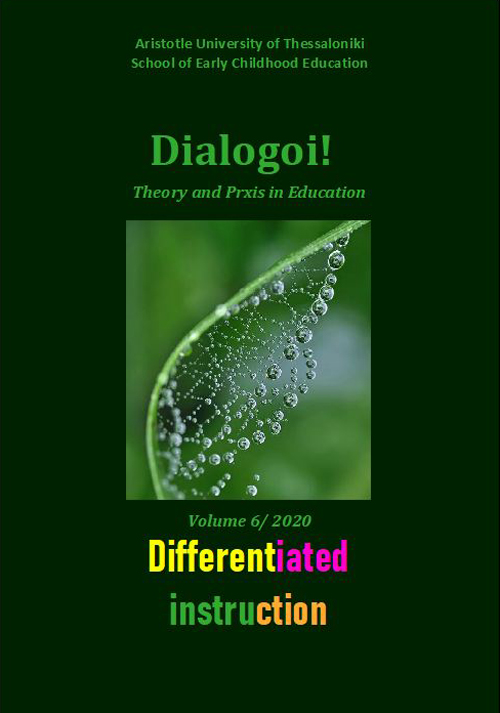Toward an holistic approach of Differentiated Instruction: Preschool Teachers' perceptions and Practices

Abstract
In the first part of the present paper, we seek a) to redefine differentiated instruction on a theoretical ground by including it in a holistic educational approach, and b) to investigate the prerequisites for the implementation of differentiated instruction practices by reviewing relevant research on teachers’ perceptions of differentiation as well as research on attempts to use it in the classroom and particularly their limits and difficulties.
In the second part, based on the theoretical background, we focus on preschool education and we try: a) to analyze both preschool teachers’ perceptions about differentiated instruction and the differentiated practices they claim to use in their preschool classrooms drawing data from 100 questionnaires and b) to present perceptions, practices and reflections of 9 preschool teachers in their attempt to implement differentiated instruction in their classrooms.
Results shows that although differentiated instruction is gaining ground in teachers’ speech and that teachers recognize its role in creating a meaningful learning environment and in providing educational opportunities for all students, the concept of ‘differentiated instruction’ still remains unclear and is accompanied by several misunderstandings and ambiguity.
In order to implement differentiated instruction as part of a “holistic” educational approach, teachers have to turn into reflective practitioners, to work critically on their personal educational experiences, to participate in long term training programs and to create communities of learning and practice.
Article Details
- How to Cite
-
Σφυρόερα Μ. (2020). Toward an holistic approach of Differentiated Instruction: Preschool Teachers’ perceptions and Practices. Dialogoi! Theory and Praxis in Education, 6, 119–142. https://doi.org/10.12681/dial.25549
- Issue
- Vol. 6 (2020)
- Section
- Special Theme

This work is licensed under a Creative Commons Attribution-NonCommercial-ShareAlike 4.0 International License.
Authors who publish with this journal agree to the following terms:
- Authors retain copyright and grant the journal right of first publication with the work simultaneously licensed under a Creative Commons Attribution Non-Commercial License that allows others to share the work with an acknowledgement of the work's authorship and initial publication in this journal.
- Authors are able to enter into separate, additional contractual arrangements for the non-exclusive distribution of the journal's published version of the work (e.g. post it to an institutional repository or publish it in a book), with an acknowledgement of its initial publication in this journal.
- Authors are permitted and encouraged to post their work online (preferably in institutional repositories or on their website) prior to and during the submission process, as it can lead to productive exchanges, as well as earlier and greater citation of published work (See The Effect of Open Access).


